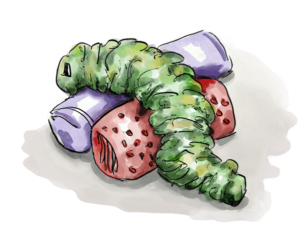Wilms Tumor Symptoms and Questions Answered

When our family first got the diagnosis that Ellie had stage 3 Wilms kidney cancer, it was a shock. It was so unexpected and we had so many questions.
What are the symptoms?
One of the challenges is that Wilms tumor can present with various symptoms. It’s essential for parents and caregivers to be vigilant and seek medical attention if they notice any concerning signs, especially symptoms that are recurring. Here are some common symptoms of Wilms tumor according to the Mayo Clinic:
- Abdominal Swelling or Mass: One of the most noticeable signs of Wilms tumor is the development of a firm, often painless mass or swelling in the abdomen. Parents may notice an unusual lump while bathing or dressing their child. This is how we first noticed Ellie’s tumor.
- Abdominal Pain: Some children may experience abdominal pain or discomfort. The pain may be persistent or intermittent and might not always correlate with physical activity or meals.
- Fever:Unexplained fever, which is not associated with other common illnesses, can be a symptom of Wilms tumor. If a child experiences persistent, unexplained fever, it’s important to consult a healthcare professional.
- Blood in the Urine: In some cases, Wilms tumor can lead to blood in the urine. This may result in the urine appearing pink, red, or brown. It’s crucial to note any changes in urine color and report them to a healthcare provider.
- High Blood Pressure: Wilms tumor can affect blood pressure levels. Parents should monitor their child’s blood pressure regularly, especially if there is a family history of hypertension.
- Loss of Appetite or Weight Loss: Children with Wilms tumor may experience a decrease in appetite, leading to weight loss. Persistent changes in eating habits and weight should be discussed with a healthcare professional.
- Fatigue: Generalized fatigue or lethargy can be a symptom of various health issues, including Wilms tumor. If a child appears unusually tired or lacks energy, it is essential to consult a healthcare provider.
It’s important to note that these symptoms can be caused by various conditions, and the presence of one or more does not necessarily indicate Wilms tumor. However, medical evaluation is crucial for an accurate diagnosis and timely initiation of appropriate treatment. If parents observe any concerning symptoms in their child, they should consult a healthcare professional for a thorough examination and further diagnostic tests.
For our family, Ellie had a number of these symptoms and it took repeated examinations until all the pieces were put together and we got the diagnosis of stage 3 Wilms tumor. It was just a few days later that she had surgery to remove the football-sized tumor and her kidney.
Is Wilms Tumor Usually Found in Children?
Yes, it is most commonly found in children, usually between the ages of 3 and 4. Ellie was seven years old. However, it can occur in older children and even, though rarely, in adults.
The reasons behind its occurrence are not entirely clear, but advancements in medical research have paved the way for effective treatments and improved survival rates.
What is the survival rate?
The good news is that the survival rates for Wilms tumor have significantly improved over the years.
With early detection and appropriate treatment, the overall survival rate is around 90%. This uplifting statistic underscores the importance of regular medical check-ups and prompt action when symptoms arise.
How is Wilms Tumor Cured?
Treatment typically involves a combination of surgery, chemotherapy, and sometimes radiation therapy. Surgery is often the first line of defense, with the goal of removing the tumor while preserving as much healthy kidney tissue as possible.
Chemotherapy and radiation therapy may follow to eliminate any remaining cancer cells. Ellie first had surgery, then radiation followed by chemotherapy. The success of these treatments has contributed to the positive outcomes seen in many Wilms tumor cases.
What are the Long-Term Effects?
While the treatment for Wilms tumor is generally effective, it’s essential to be aware of potential long-term effects. Children who have undergone treatment may face challenges such as a higher risk of high blood pressure or kidney issues later in life.
However, advancements in medical care and ongoing research aim to minimize these potential effects, ensuring a brighter and healthier future for survivors.
Can Wilms Tumor Spread to the Brain?
Typically it originates in the kidneys, but the good news is that it rarely spreads to the brain. The focus of treatment is on addressing the primary tumor and preventing its spread to other organs.
With advancements in medical understanding and technology, healthcare professionals can tailor treatment plans to target the specific characteristics of each case, providing a more personalized and effective approach.
Facing a Wilms tumor diagnosis can be overwhelming, but with early detection, advances in medical science, and a positive mindset, the outlook is promising. As we celebrate progress in the field of pediatric oncology, it’s crucial to spread awareness, support ongoing research, and foster hope in the hearts of families navigating the journey towards healing. Together, we can continue to make strides in the treatment and ultimately the prevention of Wilms tumor, ensuring a brighter and healthier future for every child.
Get In Touch!
Phone:
866-986-BOOK
(866) 986-2665
Address:
P.O. Box 1900
Penn Valley, CA 95946

